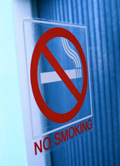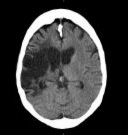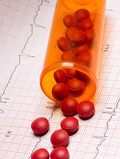You can have high blood pressure (hypertension) for years without even noticing it. The fact you have no symptoms does not protect you from the common complications of hypertension. Uncontrolled high blood pressure increases your risk of serious health problems, including heart attack and stroke.
Blood pressure is determined by the amount of blood your heart pumps and the amount of resistance to blood flow in your arteries. The more blood your heart pumps and the narrower your arteries, the higher your blood pressure.
High blood pressure typically develops without any warnings. If you don't have high blood pressure by age 55, you have a 90 percent chance of developing it at some point in your life, according to the National Heart, Lung, and Blood Institute. Fortunately, high blood pressure can be easily detected by a simple measurement at home or your doctors office. Once you know you have high blood pressure, you can work with your doctor to control it.
Signs and symptoms
Most people with high blood pressure have no signs or symptoms, even if blood pressure readings reach dangerously high levels.
Although a few people with early-stage high blood pressure may have dull headaches, dizziness or a few more nosebleeds than normal, these signs and symptoms typically don't occur until high blood pressure has reached an advanced — possibly life-threatening — stage.
Causes
In 90 percent to 95 percent of high blood pressure cases, the American Heart Association says there's no identifiable cause. This type of high blood pressure, called essential hypertension or primary hypertension, tends to develop gradually over many years.
The other 5 percent to 10 percent of high blood pressure cases are caused by an underlying condition. This type of high blood pressure, called secondary hypertension, tends to appear suddenly and cause higher blood pressure than does primary hypertension. Various conditions can lead to secondary hypertension, including kidney abnormalities, thyroid disorders, tumors of the adrenal gland or certain congenital heart defects.
Certain medications — including birth control pills, cold remedies, decongestants, over-the-counter pain relievers, herbal preparations and some prescription drugs — also may cause secondary hypertension.Various illicit drugs, including cocaine and amphetamines, also can increase blood pressure.
Risk factors
High blood pressure has many risk factors ( features that make you more likely to develop a particular condition). Some you can't control, some other are treatable.
Age. The risk of high blood pressure increases as you get older. Through early middle age, high blood pressure is more common in men. Women are more likely to develop high blood pressure after menopause.
Race. High blood pressure is particularly common among blacks, often developing at an earlier age than it does in whites. Serious complications, such as stroke and heart attack, also are more common in blacks.
Family history. High blood pressure tends to run in families.
Excess weight. Body weight is associated with high blood pressure. As a result weight loss is a very effective tool to help control hypertension.
Inactivity. People who are inactive tend to have higher heart rates. The higher your heart rate, the harder your heart must work with each contraction — and the stronger the force on your arteries. Lack of physical activity also increases the risk of being overweight.
Tobacco use. The chemicals in tobacco can damage the lining of your artery walls, which promotes narrowing of the arteries.
Sodium intake. Too much sodium in your diet — especially if you have sodium sensitivity — can lead to fluid retention and increased blood pressure.
Low potassium intake. Potassium helps balance the amount of sodium in your cells. If you don't consume or retain enough potassium, you may accumulate too much sodium in your blood.
Excessive alcohol. Over time, heavy drinking can damage your heart.
Stress. High levels of stress can lead to a temporary but dramatic increase in blood pressure. If you try to relax by eating more, using tobacco or drinking alcohol, you may only fuel problems with high blood pressure.
Certain chronic conditions also may increase your risk of high blood pressure, including high cholesterol, diabetes, kidney disease and sleep apnea. Sometimes pregnancy contributes to high blood pressure.
In a 2006 study, adults who worked more than 40 or 50 hours a week — particularly clerical and unskilled workers — were more likely to have high blood pressure than were those who worked 40 hours or less a week. Researchers tied the higher risk for workers with longer hours to unhealthy eating, less exercise, more stress and less sleep.
Although high blood pressure is most common in adults, children may be at risk, too. For some children, high blood pressure is caused by problems with the kidneys or heart. But for a growing number of kids, poor lifestyle habits — such as an unhealthy diet and lack of exercise — contribute to high blood pressure.
You should have a blood pressure reading at least every two years. We might recommend more frequent readings if you have prehypertension, high blood pressure or other risk factors for cardiovascular disease.
Screening and diagnosis
You should have a blood pressure reading at least every two years. We might recommend more frequent readings if you have prehypertension, high blood pressure or other risk factors for cardiovascular disease.
Blood pressure is measured with an inflatable arm cuff and a pressure-measuring gauge. A blood pressure reading, given in millimeters of mercury (mm Hg), has two numbers. The first, or upper, number measures the pressure in your arteries when your heart beats (systolic pressure). The second, or lower, number measures the pressure in your arteries between beats (diastolic pressure).
The latest blood pressure guidelines, issued in 2003 by the National Heart, Lung, and Blood Institute, divide blood pressure measurements into four general categories:
Normal blood pressure. Your blood pressure is normal if it's below 120/80 mm Hg — but some data indicate that 115/75 mm Hg should be the gold standard. Once blood pressure rises above 115/75 mm Hg, the risk of cardiovascular disease begins to increase.
Prehypertension.
Prehypertension is a systolic pressure ranging from 120 to 139 or a diastolic pressure ranging from 80 to 89. Prehypertension tends to progress over time. Within four years of being diagnosed with prehypertension, nearly one in three adults ages 35 to 64 and nearly one in two adults age 65 or older progress to definite high blood pressure.
Stage 1 hypertension. Stage 1 hypertension is a systolic pressure ranging from 140 to 159 or a diastolic pressure ranging from 90 to 99.
Stage 2 hypertension. The most severe hypertension, stage 2 hypertension is a systolic pressure of 160 or higher or a diastolic pressure of 100 or higher.
Both numbers in a blood pressure reading are important. But after age 50, the systolic reading is even more significant. Isolated systolic hypertension (ISH) — when diastolic pressure is normal but systolic pressure is high — is the most common type of high blood pressure among people older than 50.
A single high blood pressure reading usually isn't enough for a diagnosis. Because blood pressure normally varies throughout the day — and sometimes specifically during visits to the doctor — diagnosis is based on more than one reading taken on more than one occasion. We might ask you to record your blood pressure at home and at work to provide additional information, for this purpose we use an ambulatory blood pressure monitor.
If you have any type of high blood pressure, we might recommend routine tests, such as a urine test (urinalysis), blood tests and an electrocardiogram (ECG) — a test that measures your heart's electrical activity. More extensive might be needed on occasions.
 Complications
Complications
Excessive pressure on the artery walls can damage your vital organs. The higher your blood pressure and the longer it goes uncontrolled, the greater the damage.
Uncontrolled high blood pressure can lead to:
Damage to your arteries. This can result in hardening and thickening of the arteries (atherosclerosis), which can lead to a heart attack or other complications. An enlarged, bulging blood vessel (aneurysm) also is possible.
Heart Failure. To pump blood against the higher pressure in your vessels, your heart muscle thickens. Eventually, the thickened muscle may have a hard time pumping enough blood to meet your body's needs, which can lead to heart failure.
A blocked or ruptured blood vessel in your brain. This can lead to stroke.
Weakened and narrowed blood vessels in your kidneys. This can prevent these organs from functioning normally.
Thickened, narrowed or torn blood vessels in the eyes. This can result in vision loss.
Metabolic syndrome. This syndrome is a cluster of disorders of your body's metabolism — including elevated waist circumference, high triglycerides, low high-density lipoprotein (HDL), or "good," cholesterol, high blood pressure and high insulin levels. If you have high blood pressure, you're more likely to have other components of metabolic syndrome. The more components you have, the greater your risk of developing diabetes, heart disease or stroke.
Uncontrolled high blood pressure also may affect your ability to think, remember and learn. Cognitive impairment and dementia are more common in people who have high blood pressure.
 Treatment
Treatment
Treating high blood pressure can help prevent serious — even life-threatening — complications. Your doctor also may suggest steps to control conditions that can contribute to high blood pressure, such as diabetes and high cholesterol.
Blood pressure goals aren't the same for everyone. Although everyone should strive for blood pressure readings below 140/90, doctors recommend lower readings for people with certain conditions. The goal is 130/80 if you have or have had chronic kidney disease or diabetes.
Changing your lifestyle can go a long way toward controlling high blood pressure. But sometimes lifestyle changes aren't enough. In addition to diet and exercise, you might need medication to lower your blood pressure. Which category of medication we prescribe depends on your stage of high blood pressure and whether you also have other medical conditions. To reduce the number of doses you need a day we prefer medications that act over a long period of time so a single dose a day is all you need.In order to reduce side effects, we also favor a combination of low-dose medications rather than larger doses of one single drug. In fact, two or more blood pressure drugs often work better than one. Sometimes finding the most effective medication — or combination of drugs — is a matter of trial and error and might take some time.
The major types of medication used to control high blood pressure include:
Thiazide diuretics. These medications act on your kidneys to help your body eliminate sodium and water, reducing blood volume. Thiazide diuretics are often the first — but not the only — choice in high blood pressure medications. In a 2006 study, diuretics were a key factor in preventing heart failure associated with high blood pressure.
Beta blockers. These medications reduce the workload on your heart, causing your heart to beat slower and with less force. When prescribed alone, beta blockers don't work as well in blacks — but they're effective when combined with a thiazide diuretic.
Angiotensin-converting enzyme (ACE) inhibitors. These medications help relax blood vessels by blocking the formation of a natural chemical that narrows blood vessels. ACE inhibitors may be especially important in treating high blood pressure in people with coronary artery disease, heart failure or kidney failure. Like beta blockers, ACE inhibitors don't work as well in blacks when prescribed alone, but they're effective when combined with a thiazide diuretic.
Angiotensin II receptor blockers. These medications help relax blood vessels by blocking the action — not the formation — of a natural chemical that narrows blood vessels. Like ACE inhibitors, angiotensin II receptor blockers often are useful for people with coronary artery disease, heart failure and kidney failure.
Calcium channel blockers. These medications help relax the muscles of your blood vessels. Some slow your heart rate. Calcium channel blockers may work better for blacks than do ACE inhibitors or beta blockers alone. A word of caution for grapefruit lovers, though. Grapefruit juice interacts with some calcium channel blockers, increasing blood levels of the medication and putting you at higher risk of side effects. Researchers have identified the substance in grapefruit juice that causes the potentially dangerous interaction, which may one day lead to commercial grapefruit juices that don't pose a risk of interaction. For now, however, talk to your doctor or pharmacist if you're concerned about interactions.
Alpha blockers. These medications reduce nerve impulses to blood vessels, reducing the effects of natural chemicals that narrow blood vessels.
Alpha-beta blockers. In addition to reducing nerve impulses to blood vessels, alpha-beta blockers slow the heartbeat to reduce the amount of blood that must be pumped through the vessels.
Central-acting agents. These medications prevent your brain from signaling your nervous system to increase your heart rate and narrow your blood vessels.
Vasodilators. These medications work directly on the muscles in the walls of your arteries, preventing the muscles from tightening and your arteries from narrowing.
Once your blood pressure is under control, we generally add aspirin to your regimen to reduce your risk of cardiovascular disorders.















